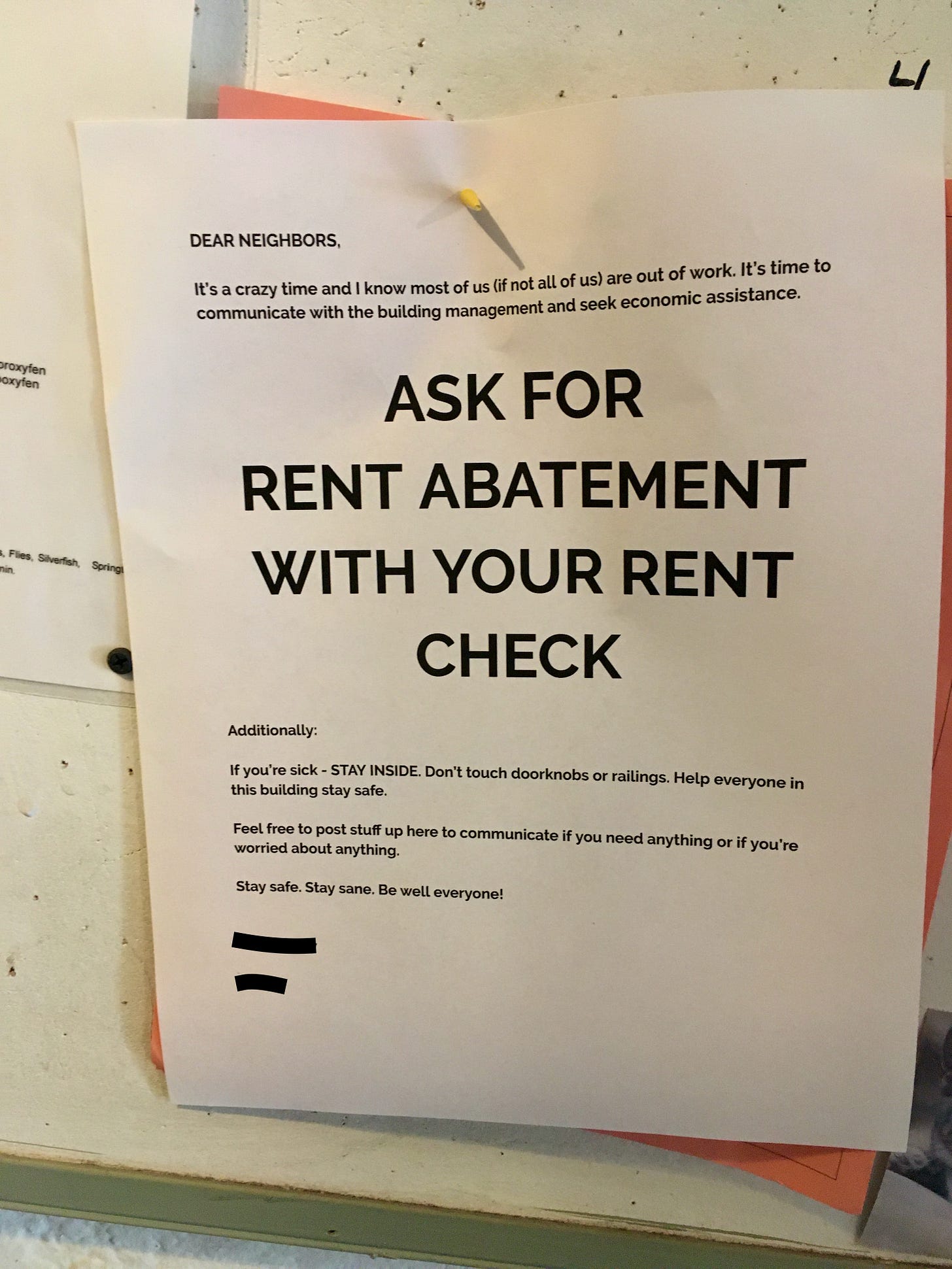It’s day 15 of the COVID-19 lockdown here in Los Angeles. And rent, like everywhere in America, is clearly becoming a central issue. There have been sporadic attempts here by renter organization to push for some sort of rent cancellation and forgiveness during the crisis — and there was even a honking drive-by protest outside of the mayor’s mansion that may or may not become an ongoing thing.
But LA, which just voted against even a basic eviction moratorium, is doing its best to ignore the problem. The mayor and city council are pretending like the city isn’t on the edge of a massive crisis. But it is. In New York some landlords — especially the ones renting to the working poor — are expecting up to 75% of their tenants to not be able to make rent tomorrow.
Without any government relief, individual renters are trying organize in whatever way they can. I saw the beginnings of this in the lobby of our apartment building in Los Feliz. We’re in this place temporarily and are actually moving to a different and more permanent apartment down the street tomorrow, but I saw this sign just go up:

In LA, where neighbors rarely talk to each other, this notice shows that something’s bigger to come. How can it not when millions here are out of the job?
One thing that COVID-19 is going to do in the coming weeks and months is reveal the depth of America’s rentier culture. This is a place where you can be fired for anything at anytime — even during a pandemic. And it’s also a place where you can be thrown out on the street if you can’t pay rent — even during a pandemic. It’s a mean, brutal system, and it’s so deeply rooted that it’s never really challenged. But if this lockdown continues for even a few more months, we’re going to see this culture fail on a national level — requiring bailouts for landlords like we’ve never seen.
I’ve been thinking about this side of America from a Soviet perspective. As a kid, I grew up hearing my mom’s stories about being raised in a cramped communal apartment in Leningrad. She had three generations living in a single room in a giant apartment that housed something like 40 people — with only one bathroom and one kitchen to share among them. It was a tough life with almost no personal space. As housing was built by the state, the number of communal apartments declined. When I was born in 1981, my parents had already moved to 2-bedroom apartment in a housing development way out on the fringes of the city. It was small and cramped and we still had six people from three generations living there. But cramped as it was, everyone was guaranteed a place to live.
This was a huge radical break from Russia’s czarist past, where even employed government clerks in St. Petersburg could afford little more than a dirty room and subsistence living — like Gogol’s Akaky Akakievich. And lowly laborers in the city had it real bad. They slept on wooden cots in pay-per-night slum dorms — and had no right to even that if they couldn’t pay.
Sure there were a lot of problems with the Soviet Union, but there were also a lot of great and radical things. One of them was that not everything was commercialized. As shitty as the housing might have been, you had a right to it. This was extremely radical politics a century ago in the Russian Empire, and it’s still extremely radical politics in our America Empire today. Even for me to say “housing for all, no matter what” sounds funny. It’s just “not serious.” And just look at the tens of thousands of people pushed to the streets here in Los Angeles.
But if COVID-19 continues, this “radical” notion about housing might start making a lot more sense to a lot more people.
I’m gonna write more about this soon. For now, take care.
—Yasha Levine
PS: Initially I wrote that my mom lived in a communal apartment with 70 people. It was more like 40. But with these numbers, who’s counting, right?
Sign up for Immigrants as a Weapon. You won’t regret it! And check out the archive.
Read my other COVID-19 lockdown stuff:
Dusting off an old book proposal: "Our farmers aren't feeding us, they're killing us."
Letter from LA: The homeless are internal refugees — victims on the run from neoliberalism
Los Angeles landlords can comfortably kick their renters out on the street during a pandemic
Notes: The Industrial and Neoliberal Origins of COVID-19 (aka SARS 2.0)
A wonderful COVID-19 immigrant story: Death by lack of money



I’m pretty sure landlords can use the SBA “loans” to cover rent abatement. Tell your landlord to get with the program and use the money that is out there!